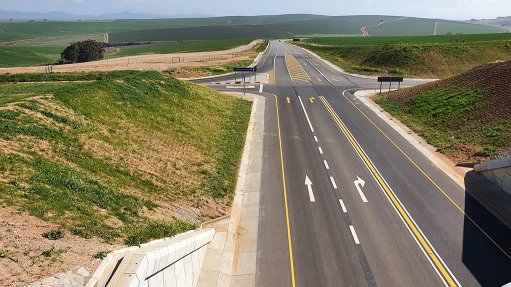The Changing Face Of Portable Certification In Tank Inspection Qualifications
This article has been supplied as a media statement and is not written by Creamer Media. It may be available only for a limited time on this website.
Company Announcement - Since 1989, API’s Individual Certification Programs have provided the petroleum and petrochemical industries with an independent and unbiased way to evaluate the knowledge and experience of technical and inspection personnel. These certification programs are based on the industry-developed standards that are recognised and used with confidence worldwide.
ICP testing, developed in partnership with industry leaders, confirms that certified inspectors and personnel will demonstrate competence in content areas that are relevant to their practices.
ICP’s certifications have come to be regarded as the most demanded and desired credentials in the industry which from the following graphs indicate this as a worldwide theme. ICP’s certifications provide applicants with a means to improve their skills through learning and strengthening their overall job performance. API certified inspectors and personnel are recognised worldwide as professionals who are fully knowledgeable of the relevant industry inspection codes and standards, and who are capable of performing their jobs in accordance with the latest and most acceptable industry inspection practices, codes and standards. These certifications allow qualified personnel to establish a career path and make valuable contributions to the safety and quality of industry operations.
API's individual certification programs benefit the industry by:
• Providing knowledgeable, specialized inspectors
• Establishing a minimum standard of knowledge and skill for personnel
• Providing higher management control of inspection practices
• Increasing employer’s confidence and peace-of-mind
• Helping maintain safety and a high level of performance
• Reducing the potential for downtime due to equipment failure
API 653 was written in 1993 and was referenced into Dangerous Goods legislation in Australia in 2010. This has caused a rash of personnel to become qualified to the Standard through API’s Individual Certification Programme (ICP) and hence enable them to sign for the integrity of a storage tank. The difficulty prior to 2010 was that to sit the API examinations one had to travel either to USA or Singapore which was both time consuming and expensive. Worldwide Tank Services commenced running training courses in 2010 and negotiated with API to become exam coordinators contracted to API. We were allowed to run group examinations in Australia and New Zealand alleviating the costs associated with travel to distant examination centres.
In 2014 the system was changed by API -with respect to examinations- to an on-line examination through a third party examination contractor. WTS continue to run both courses and assist people through to successfully gaining qualification through API ICP.
The API ICP program has grown since 1993 to encompass the following core codes;-
- API 653 Tank Inspection, Repair, Alteration, and Reconstruction
- API 570 Inspection, Repair, Alteration, and Re-rating of In-Service Piping Systems,
- API 510 Pressure Vessel Maintenance, Inspection, Rating, Repair, and Alteration,
- API 580 Risk Based Inspection
- API 577Advanced Welding and Metallurgy
- API 1169 Pipeline Construction Inspector
API Qualifications have a distinct and added advantage over Local Certification inasmuch as they are ‘portable qualifications’ recognised throughout the world, unlike industry qualifications available in most countries. Further, there are other considerations when inspecting Tanks and Pressure equipment with regard both to inspection and repair. Two examples in Australia of these are that, for example; AS 1940 Storage and Handling of Flammable and Combustible Liquids is a reference standard for the assessment of integrity in part of Storage Tanks however, it gives no guidance or Acceptance/Rejection criteria for inspection of a storage tank. API 653 guidance stops at the first flange or connection after the tank and does not address the bud area, fire suppression, signage etc.
Likewise AS 3788 Pressure Equipment-In Service Inspection - attempts to cover every part of all types of pressure equipment - pressure Piping, vessels, and pressure reliving devices but lacks detail on many aspects.
API Standards are concise and prescriptive with regard to condition monitoring of Pipes, Pipelines, Tanks and Vessels clearly defining the acceptance - rejection criteria in the relevant code.
We perceive that the adoption of API Codes will have further ramifications both now and in the future as many of the Oil/Gas Majors who prefer to use the API Standards both for design, Inspection and repair have, with respect to welding for both construction and repair, adopted ASME IX with the exception of ASME Pipelines Codes which have adopted AWS requirements. The dovetailing of the welding inspection and acceptance/rejection criteria of the Welding Standards do not often lend them to the criteria laid out in ASME and AWS requirements with regard to welding inspection criteria.
The growth of the API ICP Program over the world is evidence by the following graphs which depict a worldwide growth of 9000 – 29,000 qualified Inspectors in the program in some ten years (Courtesy API ICP)
ACTIVE CERTIFICATED PERSONNEL
OVERALL PROGRAM GROWTH WORLDWIDE
WORLDWIDE DISRIBUTION OF INSPECTOR NUMBERS
In summary, we see the continuation of the growth of API ICP worldwide and the replacement or - possibly in the short term - the adoption of a hybrid approach as in Australia and indeed the world. A situation exists in Australia where Dangerous Goods’ requirements for Storage Tanks AS 1940 are supplemented by API 653 forming a hybrid inspection requirement. It is a small step for DG administration to specify a hybrid of AS 3788 with API 510 for Pressure Vessels and API 570 for pressure piping along with API 576 for pressure relieving device inspection. We see that local jurisdictional country codes and standards may form a hybrid with API Codes to better address inspection needs but also satisfy those jurisdictional requirements imposed by various country DG Departments throughout the world.
We also require an assurance that the inspection is being conducted by knowledgeable people whom are qualified in what they do. This is difficult to assess from Country to Country where varying degrees of competence are accepted as being qualified.
API has very strict guidelines on both pre-qualification to sit examinations which are contained in the relevant codes for API 653, 570 and 510 etc. They also have an examination system which ensures that the person qualified in Australia has demonstrated the same knowledge as a person sitting the exam in Europe. API writes the examination, it is handed to a third part to be implemented (Prometrics). The results of the examination are then marked by a third party and sent to API who certifies the successful persons. This ensures there can be no collusion in the examination process and a level playing field approach to everyone taking the examination worldwide.
The core group of API qualifications - API 653, 510 and 570 - has grown in recent years to embrace API 580 Risk Based Inspection, API 577 Advanced Welding, API 571 Damage Mechanisms and API 1169 Pipeline Construction Inspector to name a few. No doubt as need arises API will continue to underwrite the necessary qualifications to ensure that industry is assured that the holder has the knowledge to complete the task of inspection to a specified code requirement. API Codes are also updated to embrace new technology hence qualified inspectors are required to recertify every three years and take an on-line test every six years to ensure they are aware of changes and modifications of the codes.
WTS conduct both In-House and Public Courses in API subjects Worldwide. For further information visit www.worldwidetank.com.au or admin@worldwidetank.com.au In SA WTS are partnered with Allsectors Business Communications kassy@allsectors.co.za
Comments
Press Office
Announcements
What's On
Subscribe to improve your user experience...
Option 1 (equivalent of R125 a month):
Receive a weekly copy of Creamer Media's Engineering News & Mining Weekly magazine
(print copy for those in South Africa and e-magazine for those outside of South Africa)
Receive daily email newsletters
Access to full search results
Access archive of magazine back copies
Access to Projects in Progress
Access to ONE Research Report of your choice in PDF format
Option 2 (equivalent of R375 a month):
All benefits from Option 1
PLUS
Access to Creamer Media's Research Channel Africa for ALL Research Reports, in PDF format, on various industrial and mining sectors
including Electricity; Water; Energy Transition; Hydrogen; Roads, Rail and Ports; Coal; Gold; Platinum; Battery Metals; etc.
Already a subscriber?
Forgotten your password?
Receive weekly copy of Creamer Media's Engineering News & Mining Weekly magazine (print copy for those in South Africa and e-magazine for those outside of South Africa)
➕
Recieve daily email newsletters
➕
Access to full search results
➕
Access archive of magazine back copies
➕
Access to Projects in Progress
➕
Access to ONE Research Report of your choice in PDF format
RESEARCH CHANNEL AFRICA
R4500 (equivalent of R375 a month)
SUBSCRIBEAll benefits from Option 1
➕
Access to Creamer Media's Research Channel Africa for ALL Research Reports on various industrial and mining sectors, in PDF format, including on:
Electricity
➕
Water
➕
Energy Transition
➕
Hydrogen
➕
Roads, Rail and Ports
➕
Coal
➕
Gold
➕
Platinum
➕
Battery Metals
➕
etc.
Receive all benefits from Option 1 or Option 2 delivered to numerous people at your company
➕
Multiple User names and Passwords for simultaneous log-ins
➕
Intranet integration access to all in your organisation


















